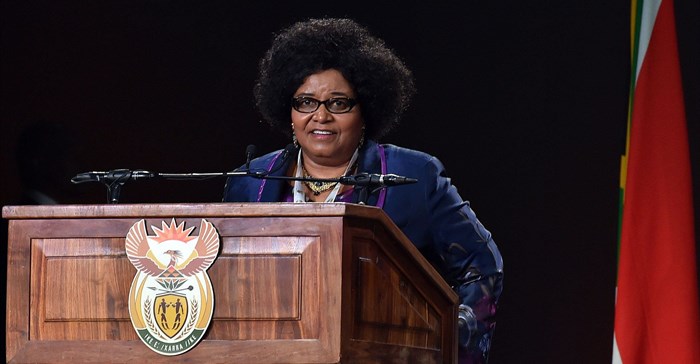Environmental Affairs minister Dr Edna Molewa has invited South Africans from all walks of life to join global efforts to combat climate change. Molewa made the call at the opening of the South African National Talanoa Dialogue in Midrand on Thursday, 23 August.

Environmental Affairs Minister Edna Molewa,
Flickr (Photo: GCIS)
The Talanoa Dialogue is a process designed to help countries implement and enhance their Nationally Determined Contributions (NDC) by 2020.
The dialogue was mandated by the parties to the United Nations Framework Convention on Climate Change (UNFCCC) to take stock of the collective global efforts to reduce the emissions of greenhouse gases, in line with the goals of the Paris Agreement adopted in 2015.
Molewa said all South Africans must work to address the climate change challenge and broaden the national conversation on how best to achieve the transition to a low carbon and climate resilient world.
“If we adopt the same can-do spirit that secured our transition to democracy, there is no doubt that we can also bring about the low emissions transition in a manner in which our environment, health and development gains are protected and new opportunities are created for development,” Molewa said.
Serious challenges ahead
She said South Africa’s national story of struggle for dignity, self-determination and inclusive, sustainable social and economic development shows that it is possible to overcome even seemingly intractable challenges through dialogue.
“The democratic dispensation we have collectively achieved through this dialogue has already delivered on a number of our political, social and economic development objectives. However, clearly more needs to be done and there are serious challenges in the road ahead.
“Climate change is one of these key challenges and it poses the single biggest threat to development, with its widespread and unprecedented impacts that disproportionately burden the poorest and most vulnerable,” Molewa said.
The minister said the multilateral process represents their best hope of addressing this pressing global challenge.
Efforts to operationalise Paris Agreement continue
South Africa continues to actively and constructively engage in efforts to fully operationalise the Paris Agreement and to raise ambition, both at the international and national level.
The Paris Agreement makes provision for the communication every five years of contributions and intended efforts of state parties with regard to mitigation, adaptation and provision of support.
“These contributions are nationally determined and the onus is on each party to determine its own best effort towards the global cause and to draw from international best practices and partnerships to help shape its pathway towards the transition to a low carbon future.
“In this way, the Paris Agreement has the flexibility and ownership by parties that allows it to cater for the very different levels of capacity and national circumstances of countries,” the minister said.
However, Molewa said national efforts are part of a collective effort linked to the achievement of globally agreed goals, and have to be premised on a number of key multilateral principles, including those of no backsliding; progression of effort over time and the need to be guided by science.
Periodic multilateral reviews
“This necessitates periodic multilateral reviews of the collective effort and a vigorous multilateral process of scientific review, reporting and dialogue to encourage all of us to continuously strive to do more.
“The Talanoa Dialogue is the first of these multilateral dialogues ahead of the full operationalisation of the Paris Agreement from 2020. As such, it is an important opportunity for South Africa and other parties to demonstrate their unwavering commitment to the Paris Agreement,” Molewa said.
With this in mind, Molewa said the environment ministers of Brazil, South Africa, India and China - who form the BASIC group - decided during a meeting held in Durban in May 2018, to each hold preparatory national Talanoa Dialogues to prepare for the high-level international Talanoa Dialogue at CoP24 to be held in Poland in December 2018.
“We have been advised that the Talanoa concept is an inclusive, participatory and transparent dialogue. The purpose is to share stories, build empathy and to make wise decisions for the collective good. During the process, participants build trust and advance knowledge through empathy and understanding [and] this consultation will be conducted in that spirit,” Molewa said.






































